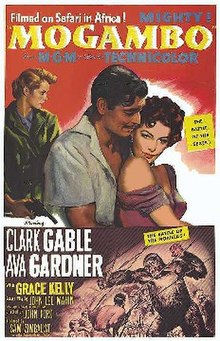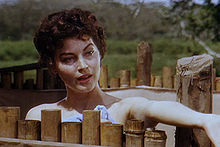| Mogambo | |
|---|---|
 Original movie poster | |
| Directed by | John Ford |
| Written by | Wilson Collison(play) John Lee Mahin (screenplay) |
| Produced by | Sam Zimbalist |
| Starring | Clark Gable Ava Gardner Grace Kelly Donald Sinden |
| Cinematography | Robert Surtees Freddie Young |
| Edited by | Frank Clarke |
| Music by | Robert Burns |
| Distributed by | Metro-Goldwyn-Mayer |
Release date | October 9, 1953 |
Running time | 115 minutes |
| Country | United States |
| Language | English |
| Budget | $3,103,000[1] |
| Box office | $8,268,000[1] |
Mogambo is a 1953 film directed by John Ford and starring Clark Gable, Ava Gardner and Grace Kelly and featuring Donald Sinden. The film was adapted by John Lee Mahin from the play by Wilson Collison.
Kelly won a Golden Globe for Best Supporting Actress (1954) and the film was nominated for two Oscars, Best Actress in a Leading Role (Gardner) and Best Actress in a Supporting Role (Kelly). The film was also nominated for a BAFTA Film Award (Best Film from any Source USA).
Mogambo is a lavish remake of the classic film Red Dust (1932) which set in French Indochina, but in the 1950s the original setting was the scene of the First Indochina War. The earlier movie also featured Clark Gable in the lead role.
Producer Sam Zimbalist thought of the title by modifying the name of the Mocambo night club.[2] Interiors were filmed at MGM-British Studios, Borehamwood, England. Exteriors were filmed in Tanganyika, Kenya, Uganda and French Equatorial Africa from October 1952 – February 1953.[3]
Plot

Eloise Y. "Honey Bear" Kelly (Ava Gardner) arrives at a remote African outpost, looking for a rich maharajah acquaintance, only to find he has canceled his trip owing to unrest in his realm. While waiting for the next river boat out, she spars with hardworking big game hunter Victor Marswell (Clark Gable), who (initially) pegs her as a certain disreputable type. When the river boat returns, it brings Donald Nordley (Donald Sinden) and his wife Linda (Grace Kelly). The Nordleys wish to go on safari to film gorillas. Marswell declines to guide them. Kelly rejoins the group after the steamer runs aground. Tensions run high between the two women when Linda is also attracted to Marswell.
Marswell agrees to take the Nordleys into gorilla country, taking Kelly halfway to join the District Commissioner, who can then escort her back to civilization. However, they find the commissioner badly wounded by recently belligerent natives. With reinforcements days away, the small party narrowly escapes, taking the mortally wounded commissioner with them.
Meanwhile, a serious romance is developing between Marswell and Linda. Only Donald is blind to the situation. Marswell plans to warn the husband, but then has second thoughts after realizing how much Donald loves her and perhaps how she would be better off with Donald remaining as her husband.
Marswell becomes depressed and begins drinking heavily in his tent. Kelly joins him, and one thing leads to another. When Linda appears, she finds them cuddling. Marswell decides that he can fix this mess by making Linda hate him and makes a show of the this cuddling followed by dismissive remarks about Linda's infatuation with "the White Hunter" to enrage her; she shoots him with his own pistol, wounding him in the arm. Kelly lies to the others, telling them that Marswell had been making advances to Linda for some time, finally forcing her to shoot him in his drunken state.
The next day, the party breaks camp, leaving Marswell behind to try to capture some young gorillas to pay for the safari. Marswell, acknowledging to himself his feelings for Kelly, proposes to her, but she rebuffs him. As a canoe takes her downriver, she suddenly jumps into the water and makes her way back to him. The two embrace.
Cast
- Clark Gable as Victor Marswell
- Ava Gardner as Honey Bear Kelly
- Grace Kelly as Linda Nordley
- Donald Sinden as Donald Nordley
- Philip Stainton as John Brown-Pryce
- Eric Pohlmann as Leon Boltchak
- Laurence Naismith as Skipper
- Denis O'Dea as Father Josef
Production notes


Grace Kelly was not the first choice for the role of Linda Nordley. Gene Tierney dropped out due to her health problems.
The movie was filmed on location in Okalataka, French Congo; Mount Kenya, Thika, Kenya — Mt Longonot and Lake Naivasha, both in the Kenyan Rift Valley and Fourteen Falls near Thika are seen as backdrops — Kagera River, Tanganyika; Isoila, Uganda and interiors were shot at the MGM-British Studios, Borehamwood, Hertfordshire, England.
The film offers some of the best wildlife shots taken of the African continent, at the time. However there were never gorillas in Kenya so the locations are an odd mix from a naturalist perspective.
The music is all performed by local native tribes (except for Gardner accompanied by player piano), unusual for Hollywood and the film records a traditional Africa and safari style.
The Francoist Spanish censors did not allow adultery to be shown on the screen. For that reason, they changed the relationship of the characters of Linda Nordley (Grace Kelly) and Donald Nordley (Donald Sinden) from wife and husband to sister and brother in the dubbed version released in Spain. However, they did not delete a scene in which both share a bed together.
Donald Sinden, then a contract star for the Rank Organisation at Pinewood Studios, was not the only person to suffer at the hands of John Ford's notorious behaviour. He recalls "Ten White Hunters were seconded to our unit for our protection and to provide fresh meat. Among them were Viscount Mandeville (now the Duke of Manchester) and Marcus, Lord Wallscourt, a delightful man whom Ford treated abysmally - sometimes very sadistically. In Ford's eyes the poor man could do nothing right and was continually being bawled out in front of the entire unit (in some ways he occasionally took the heat off me). None of us could understand the reason for this appalling treatment, which the dear kind man in no way deserved. He himself was quite at a loss. Several weeks later we discovered the cause from Ford's brother-in-law: before emigrating to America, Ford's grandfather had been a labourer on the estate in Ireland of the then Lord Wallscourt: Ford was now getting his own back at his descendant. Not a charming sight."[4]
"Before leaving camp on the first morning [of shooting] I had been told to report to the hair-dressing departments tent, where I found the make-up men armed with electric clippers: 'I have to remove the hair from your chest.' 'Whatever for?' I asked, 'Orders.' It transpired that Clark [Gable], whose chest was completely devoid of hair, had always insisted that no other actor should appear on film exposing a hirsute breast. This included any member of the crew not wearing a shirt as well. He considered it a slight on his masculinity."[5]
"We now had to return to the MGM Studios in London to shoot all the interior scenes. Someone must have pointed out to Ford that he had been thoroughly foul to me during the entire location shoot and when I arrived for my first day's work I found that he had caused a large notice to be painted at the entrance to our sound stage in capital letters reading BE KIND TO DONALD WEEK. He was as good as his word - for precisely seven days. On the eighth day he ripped the sign down and returned to his normal bullying behaviour."[6]
Reception
The film was a massive hit - according to MGM records it made $4,576,000 in the US and Canada and $3,692,000 elsewhere, resulting in a profit of $2,026,000.[1]
In popular culture
The theme for Mogambo was loosely adapted by Mark Barber for the Auckland University Tramping Club Revue in 1954. A party travelling down the Anawhata on the first Saturday of the May vacation discovered that the cry 'Mogambo' could be produced with great volume and had very satisfactory resonant qualities. It became a club call, of greeting or when making contact on a tramp, for many years.
Comedian Eddie Lawrence, on his 1956 novelty record "King Arthur's Mines," played a great white hunter named Moe Gambo.
Murray "Murray the K" Kauffman, popular 1950s and 1960s New York City DJ, used the chant "Ah, Bey, ah bey, koowi zowa zowa" lifted from Mogambo as one of his trademark on-air phrases.
Mogambo was also the name of the main villain in the Bollywood movie Mr India.
Harry Cohn once observed, "MOGAMBO is a a terrible title. MOGAMBO, starring Clark Gable and Ava Gardner, is a great f...ing title."[7]
Notes
- ^ a b c The Eddie Mannix Ledger, Los Angeles: Margaret Herrick Library, Center for Motion Picture Study.
- ^ p.144 Zinsser, William Knowlton Seen Any Good Movies Lately? Doubleday, 1958
- ^ "Mogambo (1953) - Misc Notes". TCM.com. 1953-10-09. Retrieved 2012-10-01.
- ^ A Touch Of The Memoirs Donald Sinden. Hodder & Stoughton 1982. page 174
- ^ A Touch Of The Memoirs Donald Sinden. Hodder & Stoughton 1982. page 175
- ^ A Touch Of The Memoirs Donald Sinden. Hodder & Stoughton 1982. page 185
- ^ From Story by Robert McKee p 409